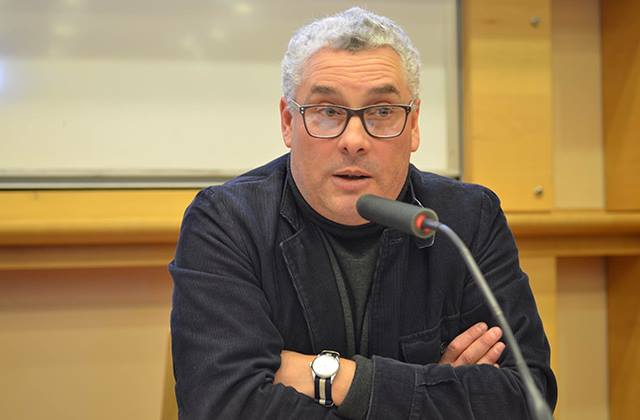“OSCE should not be instrumentalized in the conflict between Yerevan and Baku”

Yerevan Office of Organization for Security and Co-operation in Europe (OSCE) will suspend its activity on August 31, 2017. It was founded in 2000 to assist Armenia develop democratic institutions and strengthen civil society. To prevent closure of the Office extensive negotiations have been launched in 2016 by Germany’s presidency and in 2017 by Austria’s presidency. However, through Baku’s efforts consensus wasn’t reached on mandate of the Office.
“The EU supports the substantial presence of the OSCE in all the countries of the South Caucasus. The Yerevan Office plays an important role in terms of meeting the needs of its host country, Armenia. The concerns raised by Azerbaijan that the Yerevan Office should not be involved in the processes over the conflict have been reflected in the formulations of the Austrian chairmanship, while the host country has accepted that solution. The fact that even that gave no results is disappointing.
The issue of the formulations that has led to the stalemate situation should not become an obstacle for the prolongation of the mandate of Yerevan Office. We call on the sides to demonstrate extra will for finding a solution to the issue as soon as possible,” Head of the European diplomacy Federica Mogherini announced early this month.
“168 Hour” interviewed Emmanuel Dupuy, advisor to the Defense Minister of France, President of the Institute for Prospective and Security in Europe, covering closure of OSCE Yerevan Office.
OSCE Yerevan Office is being closed by Baku’s demand, as decisions in that organization are adopted through consensus. Earlier, in 2014 OSCE Office in Baku was closed due to issues between the West and Azerbaijan linked to the democratic condition in the country. How would you comment on this situation? What after-effects it may have?
The decision to close OSCE Yerevan Office is, of course, bad news for everyone. After the closure of Baku’s Office in 2014 and the Tbilisi Office in 2009, after 17 years of presence, the last office to be maintained in South Caucasus was the Yerevan Office. Therefore, the impossibility to find a consensual agreement concerning the extension of the mandate of the Vienna-based eurasian organisation is to be addressed urgently.
Federica Mogherini, European Union High Representative for Foreign Affairs and Security, has taken the right stance concerning this vital issue, a few days ago, addressing full support to Austrian Chairmanship of OSCE, and advocating for solutions acceptable for each parties. The first and essential is that OSCE should not be instrumentalized in the conflict between Yerevan and Baku, but, on the contrary, used as a “mediator” and “facilitator” not to mention a “mentor” towards confidence building measures and long lasting peace and stability process, the will also benefit neighboring countries, such as Georgia, Russia, Iran, Turkey.
Some Armenian political scientists consider Russia instigated Azerbaijan to this step, which is generally discontent with the work of both MG and the entire organization, although it’s a MG member. Is that possible?
I would rather stress that Moscow is willing to push it’s own ownership and vision of Eurasian cooperation, and that OSCE is not the essential actor in that regard. The recent Eurasian Economic Community (EEC) Council, held on April 28, confirmed that Moscow is willing to strengthen the links between EEC and Eurasian Economic Union (EAEU) in order to create the conditions of more effective, both bilateral agreements as well as a 5-state multilateral approach.
Russia is thus pushing for more integration from observing states, such as Moldova and Tajikistan, in order to forster a more inclusive vision to regional dispute resolutions…The will of Moscow to promote a trilateral canal of discussion concerning the Karabakh issue, such as the St. Petersburg format, bringing president Aliyev and Sargsyan to discuss under the direct auspices of Vladimir Putin confirms this new diplomatic strategy.
Azerbaijan prevents the activity of OSCE Yerevan Office also for the reason that it doesn’t intend to implement agreements reached in Vienna, in particular, installation of investigative mechanisms on the contact line and in that issue Russia influences on Azerbaijan in a shadowed manner. And although Russia doesn’t speak of it, that issue was eliminated from the negotiation agenda in St. Petersburg. Why is Russia against installation of those mechanisms?
I should start by reminding that the observatory mechanism on the contact line is not completely shut down. It’s still in effect, the common objective that the two parties (Yerevan and Baku) accept common procedures of planned monitoring and observation of the Line of Contact. Baku proposed to use a surveillance aerostat, on the area to be observed (west of Seysulan and Martakert district).
Since obviously these OSCE mechanisms seem irrelevant, or not commonly accepted, the logical solution would be to address the situation on another basis. Thus, the idea to use the Collective Security Treaty Organization (CSTO) framework to advance towards more inclusive stability and resolution of a too long lasting conflict. But, for that to be relevant, Baku needs to integrate the Collective Security Alliance…Let’s hope that decision will come soon.
The EU Ambassador to Armenia Piotr Switalski said Yerevan Office closure is a bigger blow for OSCE , than for Armenia. What do you think of this? Is there any way to keep presence in Armenia and in the South Caucasus?
As already mentioned, the EU statement (dated May 4) is very clear about the strong will of both organisations (the EU and OSCE) to keep a high-profile position not only in Armenia but in all South Caucasus, addressing border disputes, sovereignty claims, as well as to keep concrete presence and action, in three South Caucasus countries, belonging to the Eastern Partnership (EaP), in regards to implementation of the Deep and Comprehensive Free Trade Area (DCFTA) with the three countries, amongst which: the one signed between Brussels and Yerevan in July 2013.
In parallel with Nalbandian-Lavrov-Mammadyarov meeting, organizational work on new batch of Russian armaments and contemporary military equipment was provided to Azerbaijan on April 26, which Russia supplied in the framework of the agreements on military cooperation signed in 2003. Please, comment on this situation. Why Russia contributes to strengthening of Azerbaijan’s military privilege?
The military cooperation between Russia and Azerbaijan, is, as you have rightly mentioned, growing since it was signed between the two states in 2003. This “privilege” as you mention, should also be put in comparaison with the defense agreement linking Yerevan and Moscow, since it was signed in February 2016 and is, on the same basis of your question, as what you have focused one, another “pillar” of Russia geopolitical proxy strategy.
I should add that increase of UAV’s (coming from Israel for Azerbaidjan / from Turkey on the Armenian side) as well as installation of Iskander-M in Armenia and the will of Baku to counter this strategic new reality by purchasing equivalent ballistic missiles, is a complex burden for implementation of peace and diplomatic solution to the 25 years conflict between the two neighbors, yet enemy, countries.
I am confident, nevertheless, that “enlargement” to Iran and Turkey, as geopolitical, geocultural and geoeconomic regional and global actors, offers a new diplomatic track, on which to “elaborate” new confidence building and “step by step” approach the conflict.
Gayane Khachatryan

























